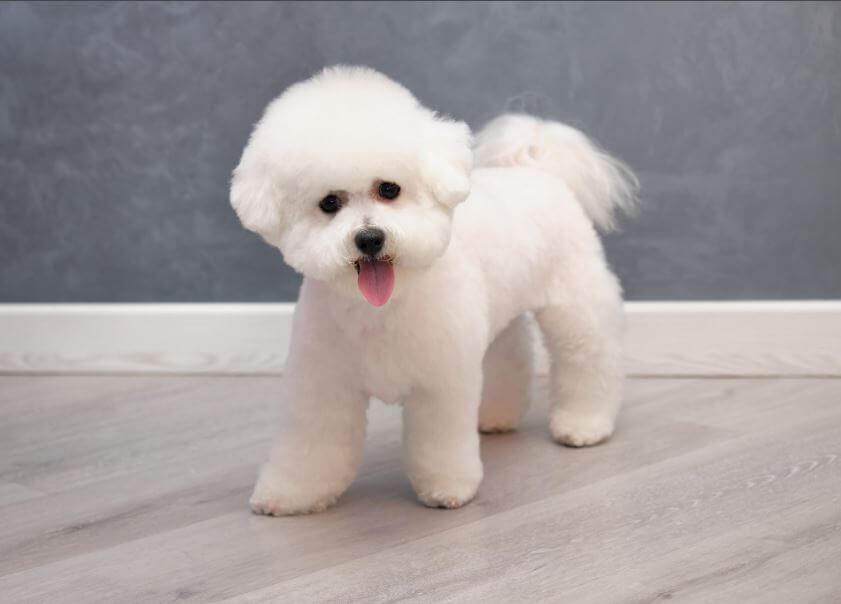
Bichon Frise
The Bichon Frise is a delightful dog breed known for its fluffy white coat, friendly demeanor, and playful nature. Here’s a comprehensive overview of this charming breed:
1. Origin and History
The Bichon Frise has an interesting lineage, with roots tracing back to the Mediterranean region. They are believed to have descended from the Barbet, a water spaniel, leading to their classification as a type of Bichon (small dog). Initially popular in Spain, the breed became a favorite among French nobility during the Renaissance period. They later transitioned to becoming circus dogs and street performers due to their trainable and sociable nature, which contributed to their worldwide popularity.
2. Physical Characteristics
- Size: The Bichon Frise is a small breed, typically weighing between 12-18 pounds and standing about 9.5-11.5 inches tall at the shoulder.
- Coat and Color: This breed is famous for its dense, curly, and hypoallergenic white coat, which feels soft and plush to the touch. Their undercoat and topcoat combine to create a soft, powder-puff appearance.
- Eyes and Ears: They have dark, round eyes that give them an expressive, cheerful look and ears that are dropped and covered with long hair.
- Tail: The tail is curved gracefully over their back, adding to their elegant appearance.
3. Temperament and Personality
Essentials for Your Newly Adopted Pet
Welcoming a shelter pet into your life is a beautiful journey. Here are some handpicked items to help your new friend feel safe, loved, and right at home:
Bichon Frises are well-known for their upbeat and friendly nature. They are:
- Affectionate and Loyal: These dogs bond closely with their families and thrive on human interaction.
- Sociable: They are great with other dogs, pets, and children, making them excellent family dogs.
- Playful: The Bichon Frise maintains a puppy-like playfulness throughout their life, making them fun companions.
- Intelligent and Trainable: Their intelligence makes them relatively easy to train. They respond best to positive reinforcement and gentle, consistent training.
4. Exercise and Activity Needs
Despite their small size, Bichon Frises are energetic dogs that need regular activity:
- Daily Walks: At least 30 minutes of moderate exercise per day is recommended to keep them happy and healthy.
- Playtime: They enjoy interactive games and mental stimulation through activities like fetch, puzzle toys, and obedience training.
5. Grooming and Maintenance
The Bichon Frise requires regular grooming to maintain their signature fluffy appearance:
- Brushing: Daily brushing is essential to prevent matting and tangles. Their curly coat can trap dirt and debris, so consistent grooming is necessary.
- Bathing: They should be bathed every few weeks to keep their white coat looking pristine.
- Professional Grooming: Many owners opt for professional grooming every 4-6 weeks to maintain their coat’s shape and cleanliness.
- Tear Staining: The breed is prone to tear staining around the eyes, so regular cleaning is recommended.
6. Health and Lifespan
The Bichon Frise is generally a healthy breed but can be prone to specific health issues:
- Allergies: They may suffer from skin allergies that require special care or diet adjustments.
- Dental Problems: Dental care is essential for this breed, as they are prone to dental disease.
- Patellar Luxation: A condition in which the kneecap can slip out of place.
- Bladder Issues: Some Bichons may experience bladder infections or stones.
- Lifespan: With proper care, a Bichon Frise can live a long, happy life, averaging between 12-15 years.
7. Training and Socialization
- Positive Reinforcement: Bichons respond well to training that includes treats, praise, and affection. They can be sensitive to harsh treatment, so positive methods work best.
- Socialization: Early exposure to various people, environments, and experiences helps prevent shyness or behavioral issues.
- Potty Training: Some Bichon Frises may take a bit longer to housetrain than other breeds, so patience and consistency are key.
8. Living Conditions
The Bichon Frise is adaptable and can thrive in various living situations:
- Apartment Living: They do well in apartments as long as they get their daily exercise.
- Companionship: They are not suited to being left alone for long periods and can develop separation anxiety if neglected.
9. Compatibility with Families and Pets
The Bichon Frise is an excellent choice for families with children due to its gentle and playful nature. They are also good with other pets and enjoy having company. They are particularly well-suited for people who want a low-shedding, hypoallergenic breed.
10. Is a Bichon Frise Right for You?
A Bichon Frise may be the perfect addition if you’re looking for a cheerful, affectionate, and energetic companion that loves to be part of the family. However, their grooming needs and tendency toward separation anxiety mean they thrive best with dedicated owners who can give them plenty of attention and care.
Conclusion
The Bichon Frise is a bundle of joy with a fluffy exterior and a heart full of affection. They make fantastic companions, especially for families, seniors, and individuals who have time to devote to their needs. With proper grooming, training, and love, a Bichon Frise can bring years of happiness and companionship.
Affiliate Products
Up to 75% Discount

Dog Collar with Health Monitoring
BUY NOW »
Up to 55% Discount

Luxury Faux Furhuge Napping Bed
BUY NOW »

